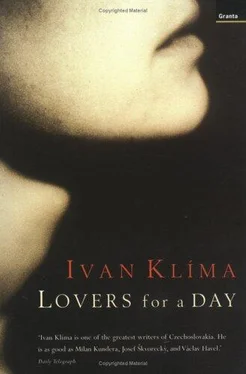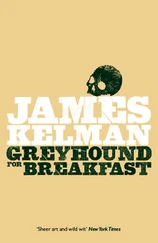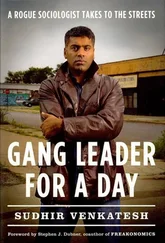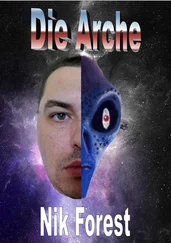The three of them left the court room. Jakub hesitated for a moment, then, without a word, started to stride away, healthy and self-confident, while she walked along silently at the side of the lame old man.
The bookbinder talked continuously as if suddenly taken aback by his responsibility: the hearing was bound to have upset her and she must have been scared by the threat of her son being taken away from her by the authorities. It was an unlikely eventuality, but should there really be such a risk, she was not to take him, an old man, into account. He would leave and remove the burden that he was becoming to her.
She shook her head. In fact she hadn't found the hearing particularly upsetting. She felt that it had nothing to do with her and she had not yet absorbed the fact that she might lose her son.
The old man at her side picked up the judge's words about death and those who are left alone. He said he had no right to ask her to bind herself to him, to take her away from her family and then abandon her, leaving her alone in the world.
She listened to him horrified. How could he talk so coldbloodedly if he loved her? How could he call into question the very thing that had raised them above what would otherwise be a meaningless existence?
She shook her head once more. Then they parted company and without another glance in his direction she hurried off to
fetch her son. Only now did the judges words begin to sink in. When Matous ran up to meet her at the kindergarten, she took him in her arms, hugged him and burst into tears.
Back home she played with the little boy, then fed him and put him to bed. Her husband had gone off somewhere, but for the first time in ages she did not go down to the flat below.
In the bathroom she glanced in the mirror. She had grown thin over the past three weeks, her face struck her as emaciated, with her small eyes looking even more deeply set, surrounded by a dark shadow.
Jakub returned before midnight. His face showed momentary surprise but he walked past her in silence. He stank of beer.
She lay down in the bedroom which until recently she had shared with Jakub but which neither of them used these days. The judge had warned her about loneliness should she remain with the old man and he died before she did. As if death was governed solely by age, and death alone determined people's loneliness. As if a few months of love didn't mean more than a whole life without it.
She got up, put on her dressing gown, and quietly opened the door behind which her husband was lying. He wasn't asleep, he was smoking.
'Don't take him from me,' she said, meaning her son.
He didn't even turn his head towards her.
'I don't know why it happened,' she went on, 'but we were happy.'
Jakub made a gagging noise.
'Forgive me. I don't know why it happened.' She realized that he could never understand her choice and so he could hardly grant her this wish. Receiving no reply, she turned and left the room.
She stopped outside the door on the floor below but didn't ring the bell; she just stood and waited. She listened to the silence from inside. Nothing disturbed it. She realized she had no wish to disturb it either. A man may be a cripple, but he must remain a man who did not shy away from responsibility.
She walked down the remaining six floors.
Fate offered everyone a moment when they could shine, the chance of some deed to transcend their own emptiness. But when that moment passed, what then? What should follow?
She leaned wearily against the wall of the building. She looked upwards, but the light of the stars was obscured by the glow of the street lamps.
(1987)
RICH MEN TEND TO BE STRANGE
There are men who love women, there are men who love alcohol, nature or sport, there are men who love children or work, and there are men who love money. It is possible, of course, for a man to love more than one of these, but he will always give one priority over the rest. If he is sufficiently ambitious he can hope to achieve the thing he yearns for most.
Alois Burda loved money and subordinated everything else to it. Under the old regime he was the manager of a car mart, under the new one he opened one of his own. Under the old regime he had skilfully negotiated with the few cars he had for sale and soon found a way of maximizing bribes. After the revolution, his above-board commission gave him about the same income as he had enjoyed previously. Alois Burda was therefore a rich man and as early as the 1970s had built himself a family home with a living area (in accordance with the legislation then in force) of less than 120 square metres. In reality it was three times the size. The house contained a gymnasium, a covered swimming pool and three garages, and alongside it
stood a tennis court, although he himself didn't play tennis. He had one secret bank account in Switzerland, and since the Swiss banks paid miserable interest rates, he had another in Germany. He had only been divorced once because he discovered that divorce could be a rather expensive business. With his first wife he had two sons, with his second, a daughter. He rarely saw his sons. Since they had grown up they didn't meet more than once a year. He soon grew tired of his second wife too, though she took fairly good care of the home and didn't bother him too much. Nor did she concern herself with how he spent his free time. She was fond of sports and went skiing and horse-riding, played tennis and golf and was a good swimmer, none of which interested him in the least. From time to time he would take a mistress, although he would seldom feel anything for her and expected nothing in return.
Occasionally he would ask his daughter for news from school, but he would forget her reply by the next morning and he was never entirely sure which class she was in. Then she too left school and got married. As a wedding present he gave her a new car that cost more than half a million crowns. The gift took her by surprise and she was almost ready to believe it was given with love, although it was more likely to salve his conscience or just a momentary whim. Besides, a sum like that meant nothing to Burda.
He knew a lot of people, since he had clients everywhere, but he had no real friends. At best he had a few cronies with whom he would go for a drink from time to time or dream up business deals.
As his sixtieth birthday approached, he suddenly started to suffer from exhaustion, lost his appetite and started losing weight. He put it down to his hectic lifestyle but his wife
noticed the transformation in him and told him to go to the doctor. He ignored his wife's advice on principle, and was afraid the doctor would discover that there was something seriously wrong. He decided he would take things more easily and even take a non-business trip abroad. He also visited a well-known healer who mixed him a special herbal tea and recommended that he eat pumpkin seeds every day. But none of it did any good. Burda started to suffer from stomach pains and would wake up in the night soaked in perspiration, thirsty and in the grip of a strange anxiety.
Finally, he decided to see a doctor who was one of his oldest clients and had treated his first wife. The doctor tried to give the impression that everything was in order and chatted for a while about the latest Honda.
'Is it serious?' the car dealer asked him.
'Do you want me to be totally frank?'
The car dealer hesitated, and then nodded.
'You need an operation without delay,' the doctor said.
'And then?'
'And then we'll see.'
'Aha,' Burda realized, 'it's life or death, then?'
'None of us is here for ever,' the doctor said, 'but we must never give up hope. When they open you up, we'll know more.'
The car dealer knew, of course, that when his number came up that would be it, but he was shocked none the less. After all, he still had almost ten years to go before he attained the average life span for Czech men. He had always believed that death came most frequently in the form of a road accident. And he was an excellent driver.
Читать дальше












